

 Columbia University Press New York
Columbia University Press New York
Columbia University Press
Publishers Since 1893
New York Chichester, West Sussex
cup.columbia.edu
Copyright 2007 Columbia University Press
All rights reserved
E-ISBN 978-0-231-51176-6
Library of Congress Cataloging-in-Publication Data
Carroll, David, 1944
Albert Camus, the Algerian: colonialism, terrorism, justice / David Carroll.
p. cm.
Included bibliographical references and index.
ISBN 9780231140867 (cloth: alk. paper)ISBN 9780231511766 (ebook)
1. Camus, Albert, 19131960Political and social views. I. Title. pq2605.a3734z62647 2007
848.91409dc22
2006030713
A Columbia University Press E-book.
CUP would be pleased to hear about your reading experience with this e-book at .
What they didnt like in him was the Algerian.
Albert Camus, The First Man
For Suzanne
Without Whom None of This Would Have Been Possible

I want most earnestly to believe that peace will rise over our fields, our mountains, our shores, and that then at last Arabs and French, reconciled in freedom and justice, will make an effort to forget the bloodshed that divides us today. When that happens, we who are both exiled in hatred and despair shall together recover our native land.
Albert Camus, Letter to an Algerian Militant (October 1955)
On January 4, 1960, at the age of forty-six, Albert Camus died in an automobile accident. Two years after his death, colonial French Algeria died as well, when Algeria became an independent Muslim nation and a million French Algerians, or pieds-noirs, fled their Algerian homeland. From that moment, French Algeria, the land in which Camus was born and grew up, no longer existed, and at the same time, the possibility of creating a post-colonial, multicultural, democratic Algeria of the type he advocated throughout his life was also destroyed. Camus essays on Algeria were, for the most part, criticized and dismissed during the war and then largely ignored after independence. More recently, his Algerian essays and stories, if they were discussed by critics at all, were attacked and used as evidence to prove that Camus, no matter how often and passionately he denounced the lethal effects of colonialism and argued for equal rights for all Algerians, was himself in fact an unrepentant colonialist. This was, of course, just another way of silencing his voice and refusing to hear what it actually had to say about colonial injustice and the possibilities of a multicultural, democratic Algeria emerging out of the ruins of colonial Algeria.
With the passage of time, however, the general political atmosphere has sufficiently changed for Camus to be of interest once again to an increasingly large audience. It is, of course, not unprecedented for someone who was once attacked, silenced, and then forgotten in one era to be listened to again and found to have something important to say, something that needs to be said again, to or in another historical context. The project for the present book grew out of my sense that Albert Camus had been too hastily dismissed and that it is once again an especially appropriate time to reconsider his work, especially his political essays and literary texts dealing with colonial Algeria.
This is not to imply that the global political situation has not drastically changed since Camus death or that the contemporary era is identical to the historical period in which Camus lived. There nonetheless exist sufficient connections between the postcolonial conflicts of the present era and the anticolonialist struggles of the 1950s and 1960sespecially, I would argue, between the Algerian War and the present global war on terrorismto make it profitable and I would even say necessary to read Camus again. Already during the Algerian War, but even more vigorously from the 1980s on, Camus was attacked by postcolonial critics who did not agree with his position on the war and especially with his refusal to support the FLNs (Front de Libration Nationale) armed struggle for independence or justify its use of terrorism to achieve its goals. After the war, no one to my knowledge has challenged his criticisms of French counterterrorist tactics; in fact, his criticisms have been largely ignored.
From a narrow political perspective, many of the specific criticisms leveled against Camus intransigency concerning Algerian independence could be considered valid. For example, it could be argued that Camus should have understood that recognition of and dialogue with the FLN, which had by 1956 succeeded in eliminating all competing Algerian nationalist opposition, was the necessary condition for ending the horrible bloodshed of the war. It could even be argued that his blanket denunciations of terrorism and proposals for moderate solutions to the war had by 1957 made him, if not an obstacle to the resolution of the conflict, then simply irrelevant to its eventual outcome, and that he was no longer listened to or taken seriously by either side. His most important contributions in the last years of the war were not political but humanitarian, for in a number of instances the letters he wrote demanding clemency for FLN militants who had been sentenced to death for their political activities resulted in their lives being spared. It may also be that his most important contribution to politics in general was his insistence that humanitarian concerns, the lives of individuals, had to come before political objectives.
For many years, I had for the most part agreed with the prevailing post-colonial critique of Camus Algerian political and literary texts, holding the general position that, in fact, this present book directly challenges. Everything changed for me, as I believe was the case for many others, after I read Camus autobiographical novel, The First Man, when it was published posthumously in 1994.
Thus even if, as many have argued, Camus was mistaken about a number of specific political issues, even if he made unrealistic demands on politics and proposed what most critics have argued were unlikely, if not impossible, resolutions to the violence and terrorism of the Algerian War; in other words, even if history has proven him in a number of important instances to have been wrongwhatever it might mean to be proven wrong by historyI am convinced that there is much that is right in his writings and that they can once again contribute to contemporary political debates by raising questions about the limits of politics in the never-ending pursuit of justice in a world still struggling to become truly postcolonial. The Algerian in Camus deserves to be listened to once again, and the pages that follow will attempt to demonstrate why. And if what Camus Algerian voice has to say troubles us, forces us to rethink political issues we assumed had already been resolved, to question the basic assumptions and strategies of both sides of ongoing political conflicts, and to search for alternative ways to combat violence and pursue justice, so much the better.
My deepest thanks to Richard Regosin and Suzanne Gearhart, who read a number of chapters and made invaluable suggestions for improving parts of the book.
Parts of the following chapters have previously appeared in print, but all have been substantially expanded and revised. A small amount of material from the introduction overlaps with pages from Albert CamusPolitical Journalist: Democracy in an Age of Terror, the foreword I wrote for
Next page


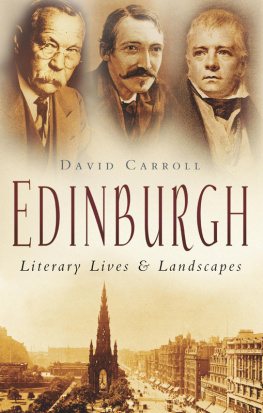

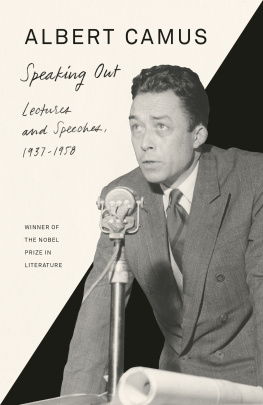
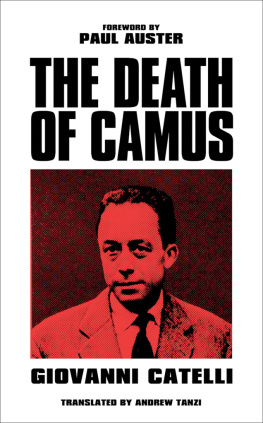
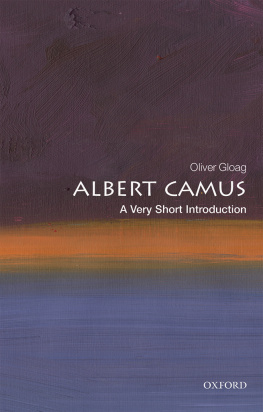
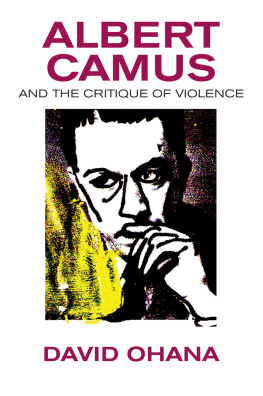
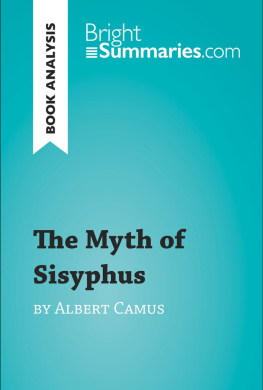
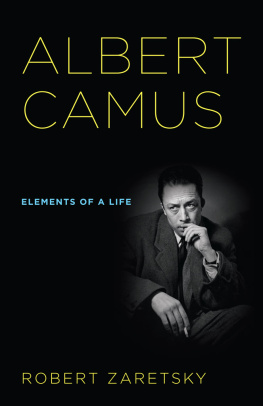
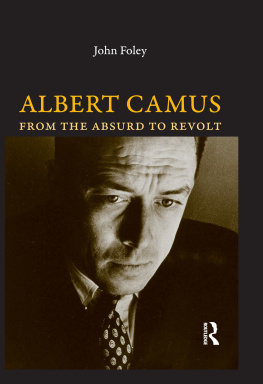
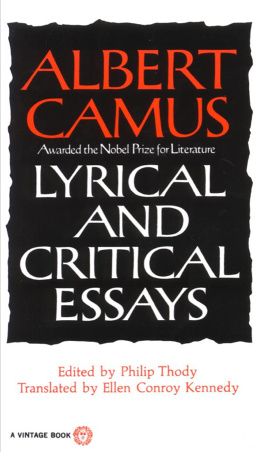
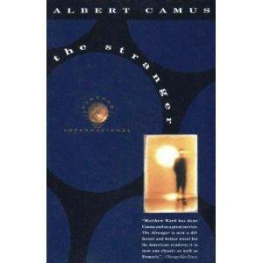
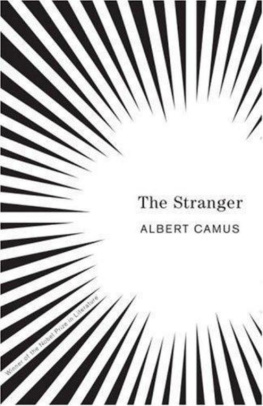


 Columbia University Press New York
Columbia University Press New York